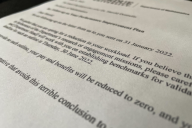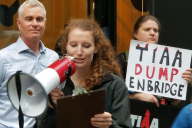You have /5 articles left.
Sign up for a free account or log in.
Many universities these days try to make retirement more attractive by providing generous incentives.
But something quite the opposite happened at public universities in Illinois last month, when there was a spike in retirements because the State Universities Retirement System of Illinois made an adjustment to how it calculated annuities. The change meant that employees who started working prior to July 2005 could choose to retire before July 2 and maintain their benefits at the same level. If they did not, they would lose 7 to 8 percent of future pension payments, and would have to work another year or more to make up that loss.
Alexander Scheeline, a professor of chemistry at the University of Illinois at Urbana-Champaign, decided he could not wait. Grant money is tight, support for teaching assistants is down and he wanted to give more time to a business he had started.
But there was one other major factor that accelerated the 60-year-old professor’s plans: the readjustment in the annuities. “If I stayed one year I would lose money, if I stayed two years I would probably lose, and if I stayed three years, I would break even,” said Scheeline, who had originally planned to retire next year.
Scheeline, who might soon get the status of professor emeritus, is not the only one to pack his bags in a hurry. Hundreds of faculty members and staff at public universities in the state retired before July 2 to maximize their pension contributions. Most of them would probably have left in the next year or so, but the mass departures, many said, also show the level of employee anxiousness in the state’s underfunded pension system and a fear of what might happen to retirement benefits in the future.
“If you had no intention of retiring, then it does not matter. But for anyone contemplating retirement in the next year, this made a lot of sense,” Scheeline said.
The Numbers
Statistics from the University of Illinois campuses show that in the six months leading to July 1 this year, 1008 academic and staff members decided to retire, compared to 507 employees for the same period last year. At the Urbana-Champaign campus, 491 employees retired in the first six months of this year when compared to 223 for the same period in 2011.
Forty-five employees retired from Southern Illinois University-Carbondale in June 2011. A year later, that number jumped to 82.
Overall, across public universities in the state, 3,356 employees retired in the first six months of 2012. Last year, 2,171 employees retired in the same time period, according to the State Universities Retirement System of Illinois.
Angie Lieb, director of member services for the State Universities Retirement System, said that many employees who were going to retire in the next year or so bumped up their date of departure.
That decrease is because the “money purchase factor” used to determine monthly annuity benefits changed as of July 2. A state law requires a study of the “economic and demographic assumptions” used to calculate the benefits every five years. The changes in the benefits came about because of a recent review, Lieb said.
Lieb said the system had been preparing for an increase in retirements as hundreds of baby boomer employees near retirement. “We will understand more when we look at the numbers for the rest of the year. It will tell us more about this spike,” she said.
According to a survey by the State Universities Retirement System of Illinois, of 500 employees who were retiring this year, 26 percent decided to stop working because of changes to the money purchase factor. Another 18 percent said their decision was based on future legislation that might affect benefits. About 24 percent said they did so because they met age and service requirements.
Fear of the Future
Robert Rich, director and professor at the Institute of Government and Public Affairs at Urbana-Champaign, said one reason that the benefits are going down is because retirees are living much longer, and costing the system more. “Another reason is that the rate of return on investments that SURS [State Universities Retirement System of Illinois] had calculated might not be realistic, causing them to go into deficit,” he said.
Experts think that some departures are directly connected to anxiety over pension reform plans in the state, which the legislature may put into effect later this year or in early 2013. One result of the reforms may be that the state shifts some of the cost of pensions to universities, Rich said. “The universities will have to reassure faculty and staff that they will work hard to lobby for the most positive package for public employees,” Rich said.
Universities might even have to offer supplementary retirement packages to attract newer employees, he said. “There is a real dilemma here, because it might lead to overall downsizing of faculty and staff,” he said.
Fred Giertz, a professor of economics at Urbana-Champaign and a former board member of the university retirement system, said the flurry of retirements can be a double-edged sword. “There are immediate savings, but the universities are losing experience and expertise in administrative areas. That is difficult to fully replace, especially when it comes to providing service,” said Giertz, who also decided to retire before July 2. “I guess the changes might be more easily managed on the teaching side.”
Barbara Wilson, vice provost for academic affairs at UIUC, said the large number of retirements will cause hardship for many departments and units. “Many have been critical employees with long experience, with incredible history, brains and memories. When they leave around the same time, it makes it challenging,” she said. The current departures come just two years after UIUC lost about 130 professors as part of a buyout program, she said.
Wilson said UIUC would rehire in critical areas. “But we will also rethink how we do things; there will be some reorganizing or combining positions. We might look at less expensive ways of doing things,” she said. Wilson said the retirements were an opportunity to rethink strategic goals, and hire faculty more aligned to these goals, adding that firm plans would be in place by the end of summer. (Phyllis Wise, UIUC's chancellor, said during a recent visit to the offices of Inside Higher Ed that the faculty vacancies will be a chance to reconfigure and hire faculty members based on emerging needs of the university and students.)








